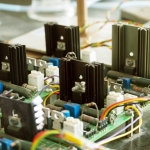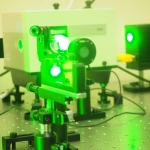Flagship Projects
The Institute essentially develops its activities through collaborative research projects.
These projects:
- Are based on interdisciplinarity
- Prioritise collaborative research and co-development
- Rely on partnerships with all sectors of society (industries, services, research centres, governmental institutions, etc.)
- Bring together provincial, regional, federal, European and international partners.
The Institute is active in setting up research projects, with its partners, which respond to the emerging problems linked to the Institute’s field.
Below you can find a list of some key projects, which highlight some of the issues our researchers tackle.
Advanced Analytics for Knowledge Transfer Monitoring and Evaluation
The goal is to transfer scientific knowledge to businesses and society, promoting cooperation between science and business, and utilizing knowledge valorization tools based on data analysis. The focus will be on promoting R&D activities, engaging scientists in business activities, project management, monitoring, evaluation, and utilizing advanced analysis methods based on artificial intelligence and big data.
Duration: April 1, 2024, to June 30, 2028
Lead Partner: Research Council of Lithuania
Partners: Lithuanian Innovation Centre, Slovak Innovation and Energy Agency (Slovakia), Autonomous University of Barcelona (Spain), LAB University of Applied Sciences (Finland), Technology Agency of the Czech Republic (Czech Republic), University of Mons (Belgium), Estonian Research Council (Estonia).
Budget: 1 742 354 Eur
Project Website: You could find project website here.
The project is funded by the program “Interreg Europe”.
Research and Business Cooperation Unit
project coordinator dr. Eglė Celiešienė
Mob. phone: ➕370 684 04 577
E-mail: egle.celiesiene@lmt.lt
UMONS is a partner of the Wal-e-Cities portfolio, which is managed by Multitel, and whose mission is to meet the challenges of Walloon cities using a “Smart Region” philosophy. The main objective of this portfolio is to develop devices and software to enable the delivery of services and meet needs in four areas: mobility, energy and the environment, transparent exchange of data, and the life and welfare of citizens. Wal-e-Cities develops technological and non-technological components, integrated to use the technology wisely and compare the results to the users’ specific needs (citizens, municipal authorities, local businesses, etc.). InforTech contributes its expertise in signal processing and telecommunications to the project.
The Internet of Tomorrow to develop business, economy and society.

The Internet of Tomorrow is one of the pillars of the European strategy. The IDEES project portfolio aims to promote the implementation of this strategy in Wallonia. The first project concerns the technological foundations needed to achieve the desired progress. It builds on the considerable advances that have been made recently in these areas (cloud computing, big data and Internet of Things), and aims to improve them to enable companies to benefit from them. The second project aims to implement co-innovation with companies to accelerate the adoption of these technologies and to optimise their value in the sectors that use them. The third project deploys pilot projects in specific sectors close to business clusters, to validate the contribution of these modern technologies in various configurations.
A fundamental aspect in understanding data quality is data provenance, also known as data lineage. Studies have resulted in a number of general-purpose theoretical formalisms for dealing with data quality and provenance. The aim of this project is to tailor and extend these formalisms to the specific needs that emerge in geological data management and 3D geological modelling. 3D geological models typically extrapolate information from different heterogeneous geolocalised data sources, such as boreholes, geological maps, or seismic reflection surveys.
Low Rank Approximation (LRA) techniques, such as principal component analysis, are powerful tools for the representation and analysis of large data, and are used in many domains, including machine learning, signal processing, data analysis, and optimisation.
Without constraints, and using the lowest number of squares, LRA can be resolved by breaking data down into singular values. However, in practice, this model is often inadequate mainly because (i) some data is wrong or missing, or because of non-Gaussian noise, and (ii) the ways in which the data is broken down must satisfy certain constraints related to the application considered. The objective of this ERC project is to remove these issues, considering four different, but complementary, aspects: (1) algorithmic complexity, (2) algorithms with guaranteed success, (3) heuristics, and (4) applications.
Railway operators face competition from airlines and road users and must therefore improve the internationalisation of traffic and interoperability between operators and infrastructure. The ERTMS standards, developed for Europe to meet this need, have spread around the world, highlighting, on the one hand, a request for changes to new functionalities and, on the other hand, the risk of emergence of non-European competition in the sector.

The Inograms project is an industrial research project that explores new technological axes to meet the needs of the non-European market of the ERTMS (European Rail Traffic Management System) by developing new features and significantly reducing the cost needed to maintain competitive solutions developed in Wallonia.
Réseau d’Outils d’Aide à la Décision – Surveillance des Troupeaux en Prairie.
The goal of Road-Step is to provide regular, timely and remote monitoring of animal welfare. IoT technologies are used to study animal behaviour, growth and health. Decision-support tools based on AI methods allow the prediction of diseases within a herd of animals.
The Fab-IoT-Lab project has allowed Fablab Mons to have an axis specifically dedicated to the Internet of Things (IoT). This project provides rapid prototyping services and offers companies the opportunity to easily test and experiment with IoT solutions.
By using the potentialities of artificial intelligence, and machine learning in particular, this research project focuses on the development of tools to help doctors diagnose mental disorders in children based on brain data.
The CuDB project aims to develop an innovative database engine using graphics processing units (GPUs), for faster and more efficient processing of data by SQL queries.
The goal of this project is to develop software, called rGPU (Remote GPU), that enables a company or cloud to make GPU sharing as practical as a GPU from a workstation, while reducing its operating cost.
